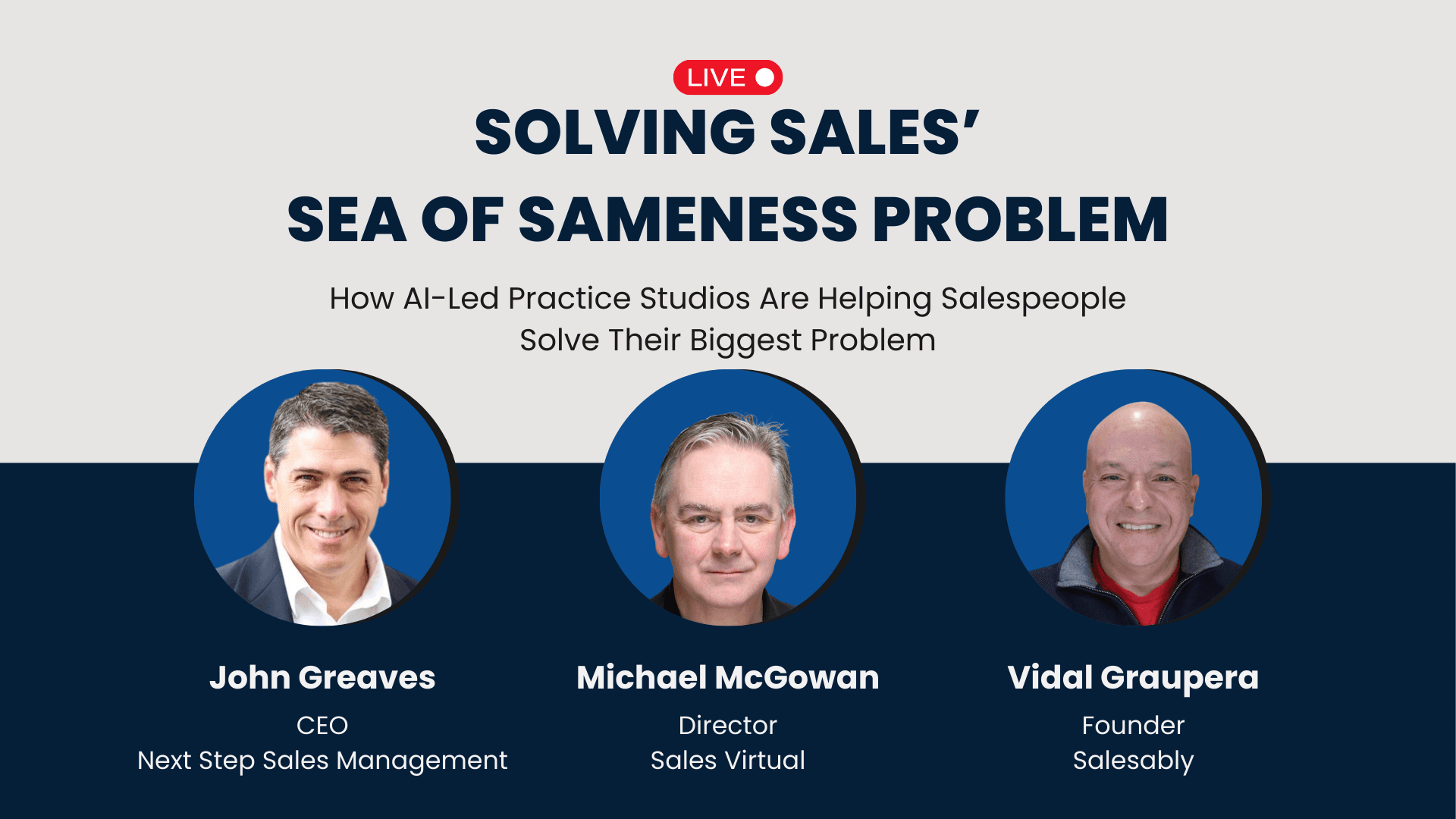The Best Sales Training Software Platforms for SMBs in 2025

Why Modern Sales Teams Need AI Training Tools
Traditional sales bootcamps and static LMS courses collapse in fast‑moving markets: messaging shifts monthly, buyer objections mutate, and reps forget 80% of classroom content within 30 days. AI‑driven platforms fix that by delivering on‑demand role‑play, granular feedback, and continuous reinforcement aligned to your live playbook.
Evaluation Criteria
| Criterion | What It Means | Why It Matters for SMBs |
|---|---|---|
| AI Role-Play | Reps practice live dialogues with an AI buyer that listens, responds, and pushes back realistically based on configured scenarios. | Builds conversational muscle memory and confidence in a safe space, preventing reps from learning on live, high-stakes deals. |
| Auto-Generation (Playbook Compounding) | AI ingests decks, PDFs, web pages, even YouTube demos, then auto-creates quizzes, role-plays, and flashcards tied to your value prop. | SMBs avoid weeks of course-building; the content you've already paid for instantly becomes interactive training, delivering ROI on day one. |
| Onboarding Speed | How quickly a typical team can implement the platform and ramp new reps with it, often aided by out-of-the-box content and intuitive UX. | Crucial for fast-growing teams or those without dedicated staff – minimizes the time from purchase to impact and gets reps productive faster. |
| Guided Practice | AI steers reps through company-specific scenarios, enforcing talk-track standards and pushing reps to hit required discovery questions, proof-points, etc. | New hires don't need a human coach on every drill; the platform itself teaches the exact conversation flow your business demands, shortening ramp time. |
| Sales Gym / Simulation Density | Unlimited, on-demand practice sessions covering every stage—cold-open, discovery, demo, negotiation—so reps can rack up "reps on reps" daily. | Builds durable muscle memory in short bursts; reps sharpen skills during dead time (between calls, before demos) and hit quota faster. |
| Turnkey / Self-Driving Deployment | The platform updates training modules automatically as new content appears—minimal admin, no professional-services dependency. | Small teams launch in days and stay current without a dedicated enablement headcount or a "content-maintenance tax." |
| LMS Capability | Features for creating structured courses, modules, quizzes, certifications, and managing a content library for formal learning paths. | Ensures training is organized and trackable, useful for compliance, foundational knowledge transfer, or blending practice with structured learning. |
Quick Comparison Table
| Platform | AI Role-Play | Auto-Gen | Onboard Speed | Guided Prac | Sales Gym | Turnkey | LMS |
|---|---|---|---|---|---|---|---|
| Salesably.ai | ✓ | ✓ | ✓ | ✓ | ✓ | ✓ | ~ |
| PitchMonster | ✓ | x | ✓ | ~ | ~ | ✓ | x |
| Quantified | ✓ | ~ | ~ | ✓ | ✓ | ~ | ~ |
| Hyperbound | ✓ | x | ✓ | ✓ | ✓ | ✓ | ~ |
| Second Nature AI | ✓ | x | x | ✓ | ~ | x | x |
| Allego | ~ | ~ | ~ | ~ | ~ | ~ | ✓ |
| SalesHood | ~ | ~ | ~ | x | x | x | ✓ |
| Mindtickle | ~ | ~ | ~ | ~ | ~ | x | ✓ |
| Highspot | x | ~ | ~ | ~ | x | x | ~ |
| Showpad | x | x | ✓ | ~ | ~ | x | ✓ |
| Seismic (Lessonly) | x | x | ~ | x | ~ | x | ✓ |
| Brainshark | x | x | ~ | ~ | ~ | x | ✓ |
Legend: ✓ = strong/full support | ~ = partial / limited | x = minimal or none
Deep‑Dive Reviews
In today's blitz‑paced market, dozens of platforms claim they'll turn rookies into quota crushers. Most still lean on yesterday's playbook—slide‑deck dumps, marathon modules, and a single "welcome to the team" bootcamp—while a newer wave uses AI and hands‑on practice to forge real sales fluency. Working hand‑in‑glove with seasoned sales coaches while architecting an AI platform, I've learned what actually converts training into revenue—and what merely checks a box.
Below is an opinionated deep dive into the leading sales‑training platforms of 2025, judging each against the modern principles of scalable enablement. The scorecard centers on six levers where Salesably excels: fluency over knowledge, playbook compounding, continuous feedback, simulation over passive content, lightning‑fast SMB onboarding, and a culture that rewards consistent, on‑brand execution. Let's dive in.
Salesably.ai
Fluency-First Training, Tuned by Your Own Content
Salesably.ai is the new kid redefining sales training by focusing on what really counts: making reps fluent in your message, not just knowledgeable. Instead of bogging you down with creating slide decks and courses from scratch, Salesably jumps off from your existing playbooks and content. It acts as a "self‑driving sales gym" – meaning it automatically gathers your current assets (pitch decks, product docs, recorded demos, battle cards, etc.) and converts them into interactive learning paths. For a busy team without a full-time training designer, this is a game-changer. In minutes, you have quizzes, role-play scenarios, and a searchable content library tailored to your real-world messaging, without weeks of manual curriculum building. That makes onboarding blazing fast, especially for resource-strapped SMBs who can't afford 90-day ramps. New hires get up to speed in days by learning from the best of what you already have, compounded and served on a silver platter.
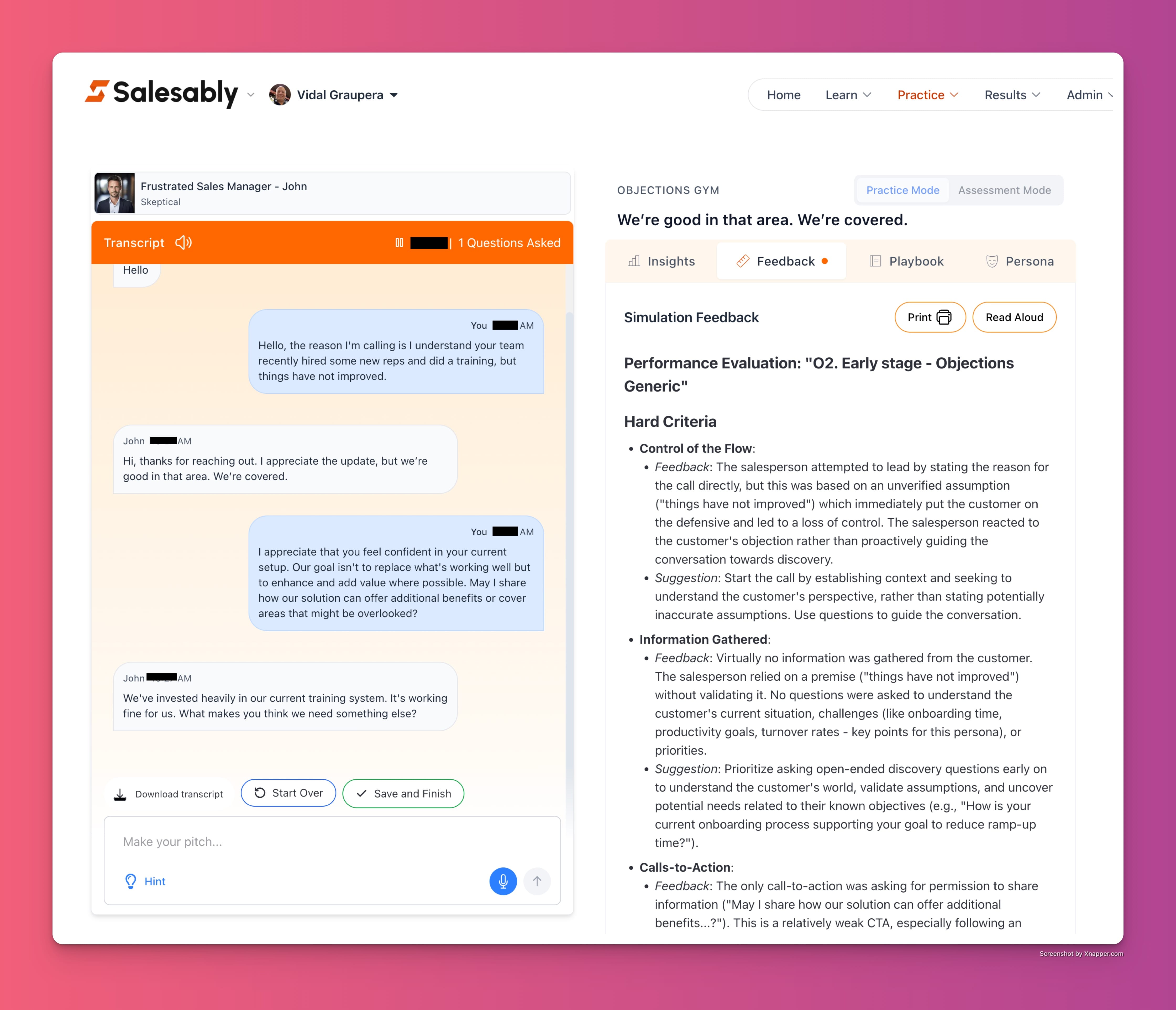
But Salesably doesn't stop at rep knowledge – it's all about skill fluency. The platform's AI Coach lets reps practice selling in realistic simulations, anytime. Reps aren't just reading PDFs or watching videos; they're pitching to a lifelike AI persona (say, a skeptical CFO) and handling curveball objections in a safe sandbox. After each pitch attempt, they receive continuous feedback: instant, pointed recommendations like "Great explanation of ROI – now try referencing a customer story for credibility." This real-time coaching loop means practice is truly continuous, not a one-off workshop. Over time, reps start to sound less like they're reciting scripts and more like they've internalized the talk track as second nature. Salesably certifies reps on genuine mastery – if you can confidently navigate a tough mock sales call with the AI, you're far more deal-ready than someone who just clicked "Next" through a course. It's simulation over content consumption, every time.
What truly differentiates Salesably is its playbook‑intelligence loop. The platform doesn't just drill reps on generic talk‑tracks; it continuously reinforces your company's own value narrative, differentiation, and proof points. Dump in whatever you already own—decks, PDFs, webpages, even YouTube demos—and the AI's playbook‑intelligence loop instantly spins up quizzes, flash drills, and persona‑based role‑plays. That auto‑generation slashes ramp from months to hours, so a ten‑rep startup can light the system up before lunch.The result: reps who don't just sound polished, they consistently articulate the company's core value in a way that lands with buyers.
Best fit: SMBs needing the fastest path from existing playbook content to AI-driven sales fluency and practice.
Mindtickle
Robust Readiness Platform Striving for Modernization
Mindtickle has long been a heavyweight in sales enablement and readiness. It offers a comprehensive suite – from formal learning modules and quizzes to content management and even "readiness" scorecards that track which reps are certified on what. If you have a large enterprise team with a ton of training content to organize, Mindtickle provides a one-stop shop. The platform shines in structured onboarding: you can assign learning paths, run live training sessions, and ensure reps check all the required boxes. Many sales orgs use Mindtickle as their central LMS for sales, appreciating its depth: extensive analytics, robust admin controls, and integration with things like CRMs and call recording tools. Over the years, Mindtickle has also introduced gamification – points, badges, leaderboards – to keep reps engaged as they complete their courses. It's a battle-tested system for knowledge transfer and compliance (think "everyone must finish the pricing module by Friday"), which it does very well.
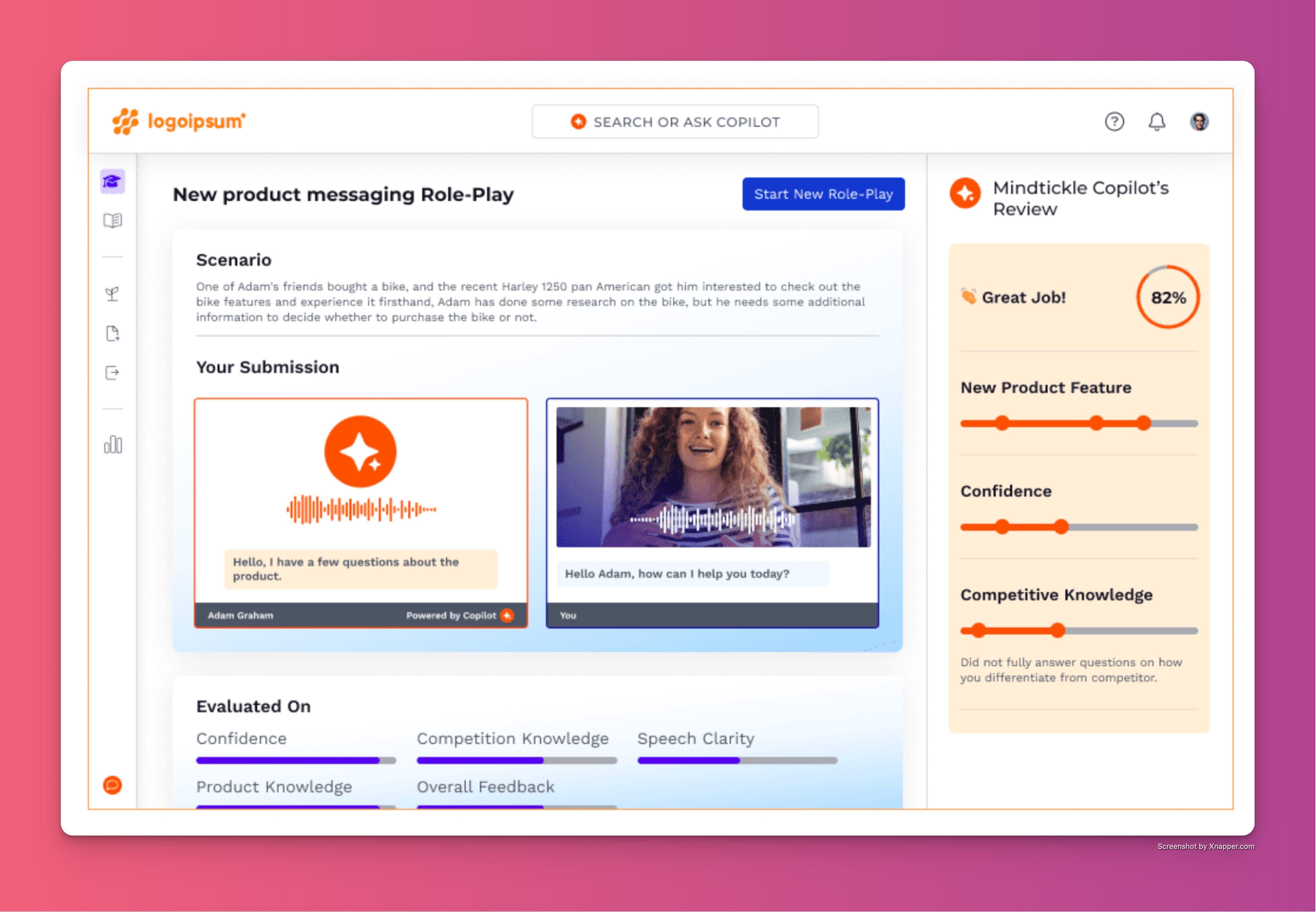
However, Mindtickle's traditional strength – a focus on content completion and certification – can also be its weakness in the modern sales context. Historically, the platform emphasized knowledge over fluency: ensuring a rep has viewed all the slides and passed the quiz, rather than proving they can pitch in their own words. Many companies using Mindtickle still found themselves asking, "Great, they aced the product test, but can they actually sell the product?" Recognizing this, Mindtickle has recently been shifting gears. They rolled out AI role-plays and an "AI Coach" feature to inject more practice into the mix. This is a clear nod to the industry's realization that reps need simulation and on-the-spot skills, not just information. It's encouraging to see a big player validate the importance of what Salesably champions (fluent pitching and real-world practice). That said, these new features layer onto an already complex platform – they're add-ons to activate, rather than the core DNA of Mindtickle. If your enablement team has the bandwidth to configure AI scenarios and manage them, Mindtickle's new practice tools can be powerful, but it's not as turnkey as a system built from the ground up for practice.
Another consideration is content burden. Mindtickle typically requires you to build a lot of training content from scratch – or at least upload and organize it manually. It's great for curating libraries of decks, PDFs, and videos, but it won't automatically create lessons out of your tribal knowledge. Without a dedicated enablement manager curating and updating the content, it's easy for a Mindtickle instance to become a dumping ground of outdated slides. This is where Mindtickle contrasts with Salesably's playbook compounding philosophy. Where Salesably automates content creation from what you already have, Mindtickle leans on you to design the curriculum. For larger enterprises with enablement teams, that's fine. For a stretched-thin startup sales leader, it can delay onboarding. In short, Mindtickle is a powerful, all-in-one platform that's evolving toward modern needs – but it still thrives in well-resourced environments that can utilize its breadth. If you need an out-of-the-box training "engine" that just spins up by itself (and scales from a handful of reps to hundreds), you might find Mindtickle a bit heavy to lift without significant effort.
Best fit: Mid-sized teams wanting a collaborative, peer-driven learning environment with integrated AI practice tools.
Allego
Video-Centric Enablement with a Broad Reach
Allego is known for its video-centric approach and enabling bite-sized learning in the "flow of work." It fosters a culture of peer sharing through easily shareable video tips, demos, and win stories, making training feel conversational. Core features include content management, learning modules, assessments, and flash drills. An AI-enabled coaching component analyzes video submissions and calls, highlighting coachable moments, making it a solid platform for mid-to-large teams focused on video learning.
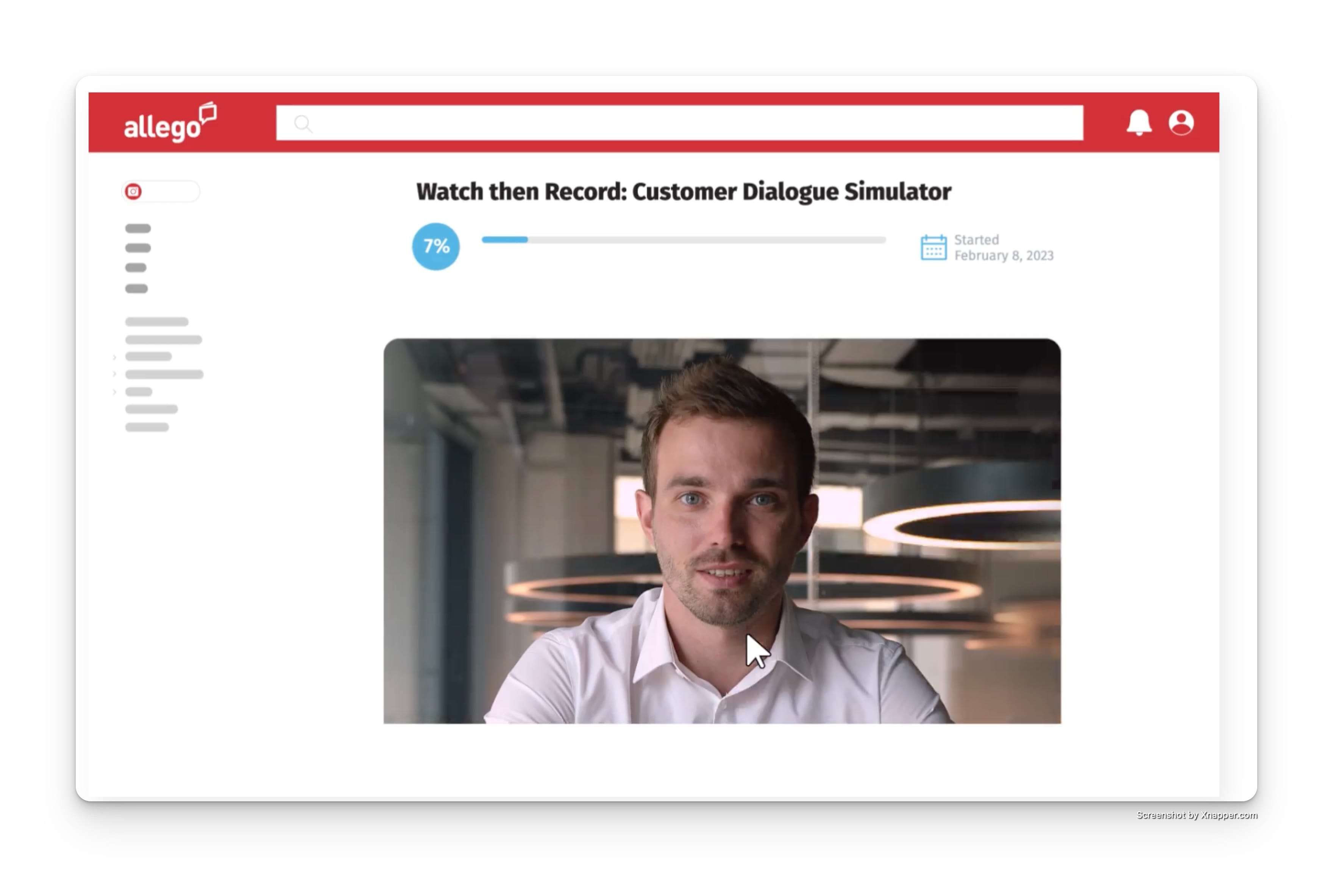
Allego excels at continuous and convenient learning, fitting into reps' daily routines. This aligns with the idea of continuous feedback, although Allego's feedback loop is often asynchronous (manager reviews later) rather than the instant, real-time feedback of AI simulators. The platform leans more towards content consumption (watching videos) compared to the simulation-first approach of Salesably, which emphasizes active practice. While Allego allows reps to submit practice videos, this typically relies on human review, unlike AI coaches providing immediate guidance.
A strength is just-in-time learning, quickly delivering relevant content updates. However, Allego lacks strong "playbook compounding"; content like videos and flashcards require manual creation, unlike Salesably's automated approach from existing assets. While Allego's user-friendliness supports faster adoption (onboarding plus), achieving deep fluency might require supplementing its practice tools. It's a dynamic hub for knowledge sharing but relies more on manual curation and review than fully automated, simulation-driven platforms.
Best fit: Mid-to-large teams focused on video-based learning, peer sharing, and demo coaching, who value convenient content delivery and have resources for manual content creation and review.
SalesHood
Collaborative Learning with a Boost of AI Assistance
SalesHood takes a community-driven approach to sales training. Founded by experienced sales leaders, it was built on the idea that peers learning from peers can be incredibly effective. The platform centers on "Huddles," which are like collaborative learning sessions or courses where reps not only consume content but also participate – by sharing videos of themselves practicing, commenting on each other's pitches, and celebrating wins together. This makes training feel less top-down. When you roll out a new play or messaging, SalesHood encourages your early adopters and stars to contribute their take – effectively treating reps as creators in the enablement process. Many companies use SalesHood to crowdsource best practices: for example, after a big deal is closed, the account exec might upload a video debrief of how they won, which becomes learning material for the whole team. This user-generated content aspect means your playbook is living and breathing, and not solely authored by managers or HR. It aligns nicely with the notion that frontline reps have a lot of knowledge to share (reminiscent of Salesably's "reps-as-creators" ethos).
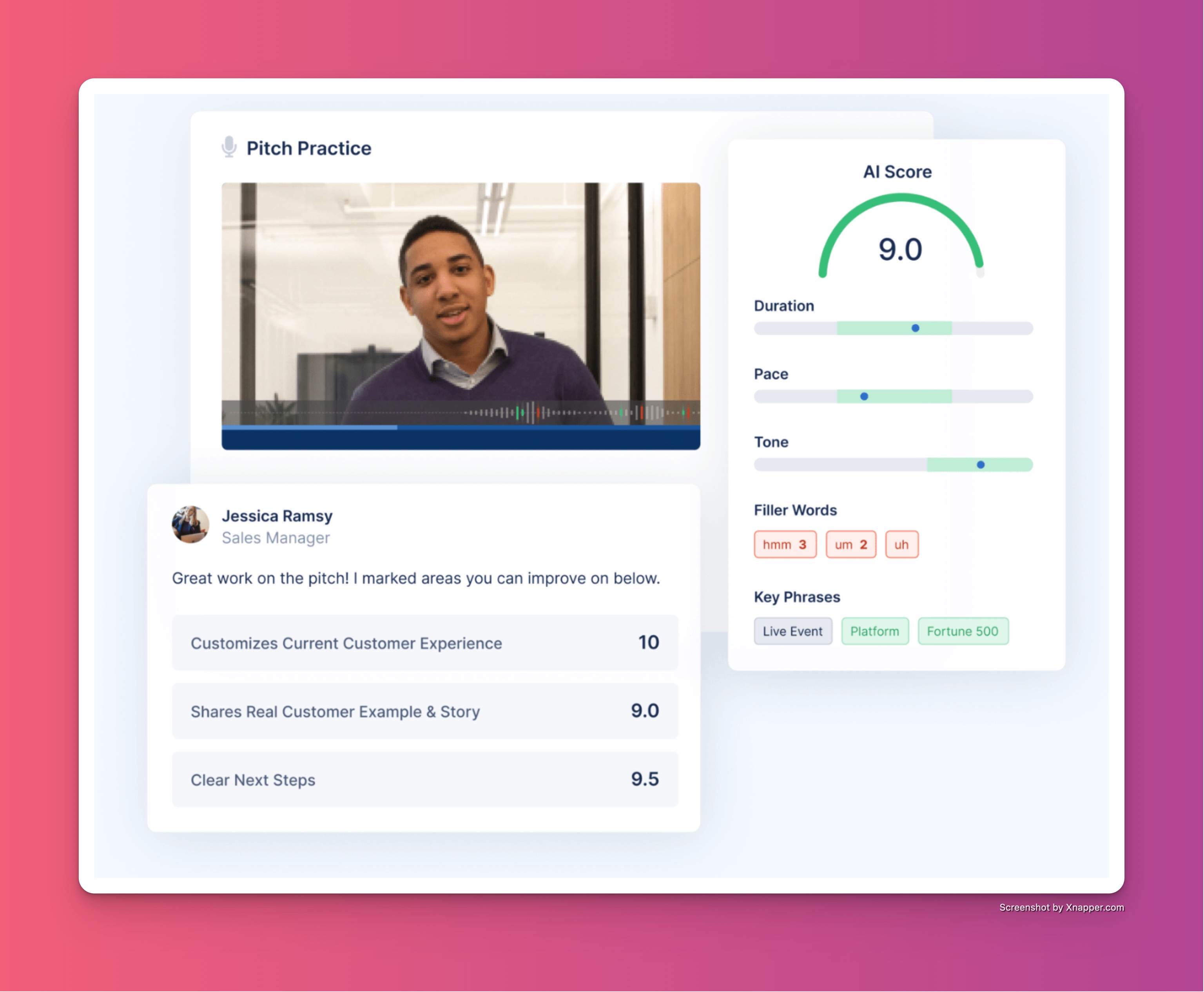
In terms of capabilities, SalesHood covers training, coaching, and content management basics. Reps can be onboarded with structured learning paths (videos, slides, quizzes – the usual suspects), and there's a tracking dashboard to see who's completed what. One of SalesHood's historical strengths is onboarding speed for mid-market teams: it comes with templates and even a Sales Training Marketplace of pre-made content (like popular sales methodologies) that you can plug in. That can shorten the time to get a program up and running if you don't want to start from zero. Still, you do need to configure those Huddles and tailor content to your messaging; it's not an automatic content generator. SalesHood has recently embraced AI as well – they offer AI role-playing and AI assistants as indicated in their platform. This means reps can practice certain scenarios with an AI or get AI-generated coaching tips on their submissions. It's a step toward providing more continuous feedback without always waiting on a manager. For example, if a rep records a practice pitch, AI might immediately score it or give textual analysis (perhaps on keywords missed or sentiment). That shortens the feedback loop, which is critical for building skill. It shows SalesHood sees the same writing on the wall: that simulation and practice need to complement their collaborative learning foundation.
Comparing SalesHood to Salesably's approach, the two share some DNA in valuing rep-generated insights and practice, but they differ in execution. SalesHood excels at creating a social learning environment; it's like a workout class where everyone is pushing each other, whereas Salesably is more like a personal trainer that's available 24/7. With SalesHood, the simulation element (AI role-play) is there, yet it may not be as deeply ingrained into every module. You might still see a lot of learning done via watching others' videos (which is great for inspiration, but again, leans toward consuming content). Salesably on the other hand, automates the practice by making the rep actively converse with AI every step of the way. Also, SalesHood's reliance on peer content means the quality of training can correlate with how engaged your team is. In a best-case scenario, it's fantastic – everyone participates and the collective knowledge soars. In a worst-case, if reps don't contribute, managers end up doing most of the work populating content. Salesably tries to eliminate that variance by auto-generating a baseline training from your materials and then prompting reps into practice sessions. Another difference is the target user: SalesHood's sweet spot has been mid-sized sales teams that want quick wins and cultural buy-in. It's relatively quick to implement compared to enterprise-heavy systems like Seismic or Highspot, which is a plus for fast onboarding. All in all, SalesHood is a strong choice if you believe in learning as a social, team sport and want a platform that facilitates that with a sprinkle of AI. Just be mindful that you'll still be curating and guiding a lot of the content and practice structure – it doesn't build the engine for you automatically in the way newer AI-centric platforms like Salesably do.
Best fit: Mid-sized teams wanting a collaborative, peer-driven learning environment with integrated AI practice tools.
Seismic (Lessonly)
Enterprise-Grade Training Meets Enablement Cloud
Seismic, particularly with its integrated "Seismic Learning" (formerly Lessonly), offers a powerful enterprise-grade solution combining content management and training. Its main draw is tight integration within the Seismic ecosystem, providing a one-stop enablement cloud. The platform excels at delivering structured curriculum models (lessons, quizzes, certifications) at scale, ensuring consistency and governance, which is ideal for large, complex, or regulated organizations.
However, its traditional LMS approach often prioritizes knowledge completion over fluency. While practice elements exist (e.g., video submissions for review), they typically lack real-time AI feedback and deep simulation capabilities. Content creation and updates are largely manual, contrasting with playbook compounding approaches like Salesably's. Seismic requires significant enablement resources to manage and can have longer implementation cycles, making it less agile for most SMBs.
Seismic Learning is a reliable choice for enterprises needing robust, integrated, and governable training infrastructure, especially those already invested in the Seismic platform. It's less suited for teams seeking rapid, AI-driven fluency development with minimal setup.
Best fit: Enterprises needing integrated content and training within the Seismic ecosystem, focused on structured curriculum and governance.
Highspot
Unified Content and Training with Guided Playbooks
Highspot excels as a unified platform for sales content management and training, favored by teams wanting a single source of truth. Its strength lies in connecting training materials directly to sales content and guided "Sales Plays," offering just-in-time learning within the rep's workflow. Highspot provides structured training (lessons, quizzes) and coaching tools (practice submissions with feedback), backed by strong analytics linking training to sales outcomes.
While strong on contextual knowledge delivery and continuous learning, Highspot's training approach is more content-centric. Practice elements exist but often rely on asynchronous manager feedback rather than instant AI coaching. Its AI capabilities are developing, but it's less focused on deep conversational simulation than specialized tools. Content creation is manual; Highspot manages and surfaces your content effectively but doesn't auto-generate training from raw assets like Salesably. It's moderately fast to onboard but requires upfront content population and structure.
Highspot is excellent for ensuring consistency and guiding reps to the right information and plays. It's less focused on intensive, AI-driven conversational practice or automated content generation. It suits organizations prioritizing content governance and guided selling within a single interface.
Best fit: Teams already using Highspot for content who want integrated training and guided selling playbooks, leveraging strong analytics.
Showpad
Intuitive Content + Coaching, Though Less AI-Powered
Showpad offers a user-friendly combination of sales content management and training (Showpad Coach), popular for its ease of use. It allows creating courses with various content types and includes tasks like recording pitch practice videos. Its integration ensures training is linked to sales collateral. The platform facilitates practice submissions and manager feedback, making it a solid choice for mid-market teams needing straightforward onboarding and simple implementation.
However, Showpad feels more traditional compared to AI-first platforms. While it supports practice, the feedback loop typically relies on manual manager review, lacking instant AI coaching or deep simulation. It ensures knowledge transfer but may fall short on building true conversational fluency without significant manager input. Content creation and updates are manual; it doesn't auto-generate training from existing materials (playbook compounding). While onboarding can be relatively quick with existing content, maintaining fresh practice exercises requires ongoing effort.
Showpad is a reliable, intuitive platform for core training and content needs. It encourages practice but lacks the automated, AI-driven coaching and simulation depth of newer tools. It's a good fit for teams valuing ease of use and integrated content/training basics.
Best fit: Mid-market teams seeking a user-friendly, integrated content and coaching platform with straightforward practice capabilities.
Second Nature AI
Virtual Pitch Partner for Practice at Scale
Second Nature AI excels by focusing solely on simulated sales conversations with its lifelike AI coach, often called "Jenny." Unlike broader platforms, it zeroes in on giving reps an always-available virtual persona for interactive role-play simulation. Reps talk, the AI listens and responds with realistic questions or objections, mimicking real customer interactions. This provides invaluable continuous feedback and practice on demand, scoring reps on key points, phrasing, and even filler words.
Its strength lies in driving fluency through "learning by doing," aligning with the simulation over content consumption philosophy championed by platforms like Salesably. Reps build muscle memory handling curveballs before facing real prospects. The instant, automated feedback enables self-serve coaching and effectively scales coaching without relying on managers' limited time.
However, this laser focus means Second Nature doesn't handle content management, formal onboarding, or collateral distribution. It requires upfront setup—defining scenarios and feeding it your playbook specifics—and doesn't perform playbook compounding automatically. Feedback depth is tied to setup quality and AI interpretation, sometimes missing human nuance. Consequently, it's often used as a powerful supplement to broader training programs.
Compared to Salesably, Second Nature is a specialist tool versus a platform suite. While Salesably integrates AI simulation with content ingestion and varied training methods, Second Nature offers potentially deeper interactive role-play as its sole function. It's excellent for significantly reducing ramp time and improving conversational skills, but needs pairing with another system for foundational knowledge and content management. Think of it as a high-tech batting cage for pitch practice—great for technique, but requires a separate 'home base' for the rest of the training program.
Best fit: Teams needing a specialized, high-fidelity AI role-play simulator for intensive conversational practice, complementing other enablement tools.
Brainshark (Bigtincan)
Legacy Workhorse Evolving with Coaching
Brainshark, now part of Bigtincan, is a long-standing player known for scalable content delivery (e.g., voice-over PowerPoints) and sales readiness. It offers a proven curriculum and assessment engine, good for large rollouts, compliance tracking, and formal certifications. Features include video coaching submissions and readiness scorecards attempting to link training to performance.
Despite evolving, Brainshark retains a more traditional, top-down approach. Its strength is in knowledge transfer and certification, but it's less focused on interactive simulation or real-time AI coaching for fluency. Practice usually involves submitting recordings for manual review, leading to delayed feedback. Content creation and maintenance require dedicated effort; it doesn't automatically generate training from existing assets. While solid for structured programs, it can feel less agile and more admin-intensive than newer, AI-centric platforms.
Brainshark remains a dependable option for organizations prioritizing formal training delivery, tracking, and readiness scoring within a structured environment, often complementing the broader Bigtincan suite.
Best fit: Organizations requiring robust, scalable curriculum delivery, readiness scorecards, and compliance tracking, often within the Bigtincan suite.
PitchMonster
Generative AI Role‑Plays for Fast, Focused Reps‑On‑Reps
PitchMonster is purpose‑built for one thing done well: live AI role‑play. You feed it a talk‑track rubric or paste a prospect's LinkedIn profile; seconds later an LLM‑powered buyer avatar takes the other side of the call. The responses are generative—no rigid decision tree—so if a rep goes off script, the AI follows and pushes back naturally. That makes it perfect for rapid objection reps or last‑minute pitch warm‑ups: open the web app, hit "Start," and battle an impatient CFO in under a minute.
Where PitchMonster shines is speed and simplicity. There's no LMS to configure and almost zero admin overhead; reps practice on demand, managers skim the automatic scorecards, and everyone gets back to real selling. The flip side is depth: scenario pivots (e.g. switching from pricing pressure to legal redlines mid‑call) usually require creating a fresh role‑play preset, and analytics stop at individual scores—no trend heat‑maps or team‑wide gap analysis. Content ingestion is manual; you type or paste the desired prompts. If you want a lightweight, low‑cost "batting cage" that keeps reps sharp between live calls, PitchMonster is excellent. But for auto‑generated drills, group‑level insights, or value‑prop fluency scoring, you'll reach its ceiling quickly.
Best fit: SDR/AE teams that already have enablement content elsewhere and need a high‑velocity, on‑demand practice tool.
Quantified
Enterprise Flight‑Simulator With Granular Call Analytics
Quantified positions itself as a sales flight simulator: reps enter a full‑screen video session with a photorealistic AI buyer, run a discovery or demo, and get forensic feedback on everything from filler‑word frequency to narrative arc. The avatar is generative, so it improvises follow‑ups in real time; meanwhile, Quantified's analytics engine benchmarks each skill against a "top rep" baseline and tracks delta over time. Enterprises love the scorecard depth—coaches can prove, for example, that a 10 % uptick in "outcome‑framing" correlates with 18 % higher win‑rates.
The power comes at a cost: onboarding often involves a CS engagement to ingest your playbook and calibrate the scoring model, and updating scenarios means working in Quantified's admin console—not quite plug‑and‑play. Auto‑content generation is emerging (you can upload PDFs to inform the avatar), but there's still more manual curation than with Salesably's "paste a link and go" flow. For orgs that can spare an enablement headcount, the hyper‑realism and data science justify the heft; for lean SMBs, it may feel like strapping a rocket engine to a tricycle.
Best fit: Large or fast‑scaling teams that crave objective, data‑rich skill benchmarking and have resources for white‑glove setup.
Hyperbound
Real‑Time AI Calling Coach for Outbound & Discovery
Hyperbound is a real‑time calling coach that drops reps into simulated phone, Zoom, or dialer screens. The AI buyer changes tone, pace, and question style on the fly—so a rep has to adapt exactly as they would in a live cold‑call or discovery meeting. Hyperbound's standout is call‑flow scoring: immediately after the mock, reps see metrics like talk/listen ratio, empathy markers, compliance flags, and a color‑coded objection‑handling score. That makes it a favorite among SDR managers who need to keep high‑volume outbound teams sharp.
Implementation is quick—upload your objection list, ICP notes, and call structure, hit publish. But Hyperbound stays in its lane: there's no LMS shell, no flash‑card builder, no deck‑to‑quiz auto‑gen. Persona realism is solid (you can tweak mood or role), yet deep product‑specific value‑prop scoring is light compared to Salesably's "fluency" rubric. Think of Hyperbound as a specialized treadmill: exceptional for cardio (live-call reflexes), but you'll want separate equipment if you also need heavy‑lifting (comprehensive content ingestion, trend dashboards, or certification paths).
Best fit: High‑call‑volume teams—SDRs, BDRs, call‑center sellers—who need a quick, repeatable way to drill phone technique and objection reflexes.
Choosing the Right Fit
| If your top priority is... | Consider these platforms |
|---|---|
| Fast, AI-driven practice from your playbook | Salesably.ai |
| High-velocity, on-demand AI role-play drills | PitchMonster, Second Nature AI |
| Real-time coaching for live calling skills (SDRs) | Hyperbound |
| Deep analytics & data-rich skill benchmarking | Quantified, Mindtickle |
| Video-based practice & peer feedback | Allego, Showpad |
| All-in-one platform (Content + LMS + Practice) | SalesHood, Mindtickle, Seismic, Highspot |
| Formal certification & compliance tracking | Brainshark, Seismic Learning, Mindtickle |
➡ Pro tip: Pilot two contrasting platforms (e.g., Salesably for role‑play + your incumbent LMS) and measure ramp time, average deal size, and rep confidence after 60 days. Let hard KPI deltas drive procurement.
Final Word
The sales training platform landscape in 2025 offers everything from all-in-one enablement behemoths to specialized AI coaches. Choosing the right solution means thinking hard about your team's needs and resources. Do you have the content and manpower to build a program, or do you need the platform to generate and drive it for you? Are you aiming to instill knowledge, or true selling fluency? The most forward-thinking teams are gravitating toward tools that reduce busywork (like content creation and scheduling) and maximize hands-on practice and feedback. Salesably.ai exemplifies that new breed – focusing on fluency over knowledge and simulation over static content.
But each of the platforms above has its merits, and often the best stack might involve pairing strengths (for example, a robust content hub with a nimble practice app). As a sales leader or enablement pro, you'll want to weigh how these platforms align with your strategy: whether it's rapid onboarding for a growing startup, global consistency for an enterprise, or creating a culture of continuous improvement. The good news is, with AI and better technology, sales training is becoming more effective and scalable. The days of dull slide decks are numbered. Whichever platform you choose, keep the end goal in sight – a team of reps who don't just know their stuff, but can confidently execute when it counts.
Author

Vidal Graupera
Vidal is the Founder of Salesably, focused on using AI to elevate human skills in sales training and enablement. He has extensive experience in building platforms that leverage artificial intelligence for sales improvements.
Table of Contents
Free Sales Training Guide
Download our comprehensive guide to building effective sales training programs that drive results.
AI Sales Training Template — 2025 Edition
PDF Guide • 19 pages • 15.8 MB
We respect your privacy. Unsubscribe at any time.

